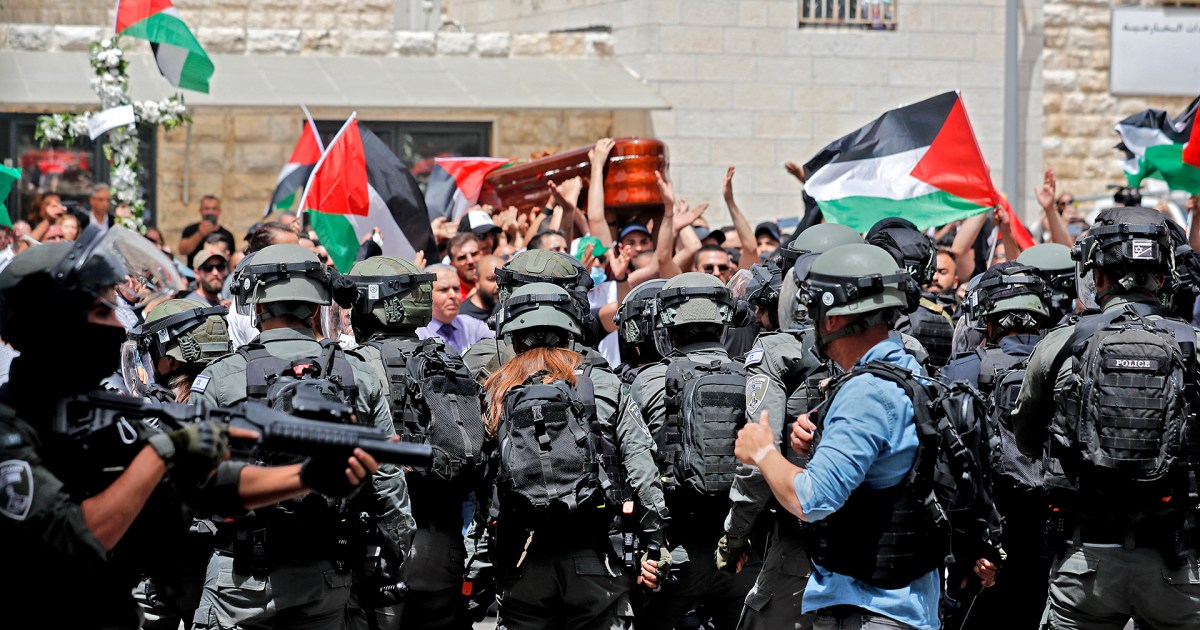The Israeli occupation army has confirmed its reluctance at the present time to conduct a criminal investigation into the assassination of Al-Jazeera correspondent Shireen Abu Aqleh, while Israel faces the possibility of early elections following the resignation of an Arab member of the Knesset in protest against the attack on Shireen's funeral.
Representative Ghida Rinawi Zoabi of the left-wing Meretz party announced her resignation from the ruling coalition in Israel in a letter published by local media.
In the letter she sent to Israeli Prime Minister Naftali Bennett, Zoabi said that the scene of the attack on the funeral of Shireen Abu Aqleh resolved her initial position to resign, in addition to the attacks on Al-Aqsa Mosque during the month of Ramadan.
She added that in the face of these attacks, she was no longer able to remain in a coalition that repudiates and deals shamefully and dishonorably with the issues of the Arab society it represents, according to the letter.
Al-Jazeera correspondent said that Bennett summoned his party members for consultations after Zoabi's resignation from the ruling coalition.
For its part, the Israeli Likud party, which opposes the Bennett government, said that it will present a bill next Wednesday to dissolve the Knesset and hold early elections after Zoabi's resignation.
With Zoabi's resignation, Bennett's coalition - which includes parties from the left, center and right - controls only 59 of the 120 Knesset seats.
Before that, he lost a seat last April when a female lawmaker from Bennett's right-wing party withdrew.
crime weapon
Meanwhile, the Associated Press quoted an Israeli military official as saying today, Thursday, that the Israeli army has identified a soldier's rifle, possibly the weapon that killed Shireen Abu Akleh.
But he added that the army cannot be certain of the matter unless the Palestinians hand over the bullet that killed Shireen for examination.
The same source said that the source of the shooting is still not clear to the Israeli army, but "we have confined the army's weapon, which may have been used in the exchange of fire near Shirin."
Earlier, the Israeli army spokesman, Avichai Adraei, said that there is no way at the present time to open an investigation into the circumstances of the killing of Shirin Abu Akleh.
Adraee added that a final decision will be taken after the operational investigation is completed and all relevant information is considered.
In response to a question by Al-Jazeera correspondent in Jerusalem, Adraee confirmed that the decision not to open the investigation was taken in accordance with the investigation policy that was approved by a decision of the Israeli Supreme Court, which states that a criminal investigation should not be opened immediately into the Israeli army's operations in the West Bank.
Israeli fears
In the same context, Amos Harel, a military analyst, told Haaretz that the Israeli army does not intend to open an investigation into the circumstances of the killing of Shirin Abu Akleh, claiming that there are no criminal suspicions, and to avoid disputes in the Israeli military and society.
In a report published by the newspaper, Harel indicated that at the end of the second Palestinian intifada, the Israeli Public Prosecution issued instructions regarding the necessity of opening an investigation into the circumstances of the killing of Palestinian civilians by Israeli fire if they were not armed, but the current attorney general apparently refrains from doing so to avoid any criticism from The right-wing side or stirring up disagreements within the army, according to the report.
For its part, the Palestinian Foreign Ministry condemned the Israeli military police's failure to investigate the assassination of Shireen Abu Akleh.
The Palestinian Foreign Ministry accused the Israeli army of ignoring dozens of live testimonies, evidence, autopsy results and other evidence condemning the occupation army.
The ministry held the Israeli government fully and directly responsible for the assassination of Shireen Abu Aqleh, and warned against the consequences of Israeli attempts to close the file, and saw it as a new crime committed against Shireen.
For his part, Palestinian Minister of Justice Muhammad al-Shalaldeh affirmed that "we have the full right to refer any perpetrator of a crime before the international judiciary represented by the International Criminal Court."
Calls are still coming from Western and Arab governments, human rights organizations and members of parliaments around the world to conduct an investigation into the assassination of our colleague Shireen Abu Aqleh, who was killed by the Israeli occupation soldiers while she was covering the storming of Jenin on Wednesday, May 11th.
Al-Jazeera correspondent said that the investigation of the Public Prosecution Office and the Palestinian Forensic Medicine Institute revealed that our colleague Shireen Abu Aqleh was killed by a live bullet that hit her behind the left ear, and penetrated her head;
Which indicates that she was targeted by a sniper weapon.
The investigation showed that it is not excluded that Sherine was targeted personally, as she is a prominent and active journalist in the Al-Jazeera network.
The information that reached the island also indicates that the bullet collided from the inside with the protective helmet that she was wearing, as there are traces of crushing on the inner part of the helmet, and cracks in the outer shell;
Therefore, the bullet did not go out of the head.
According to the information obtained by Al-Jazeera, this indicates that the shooter was, for the most part, an experienced sniper, and that the bullet that killed Shireen Abu Aqila was of the type used only by the occupation forces.

